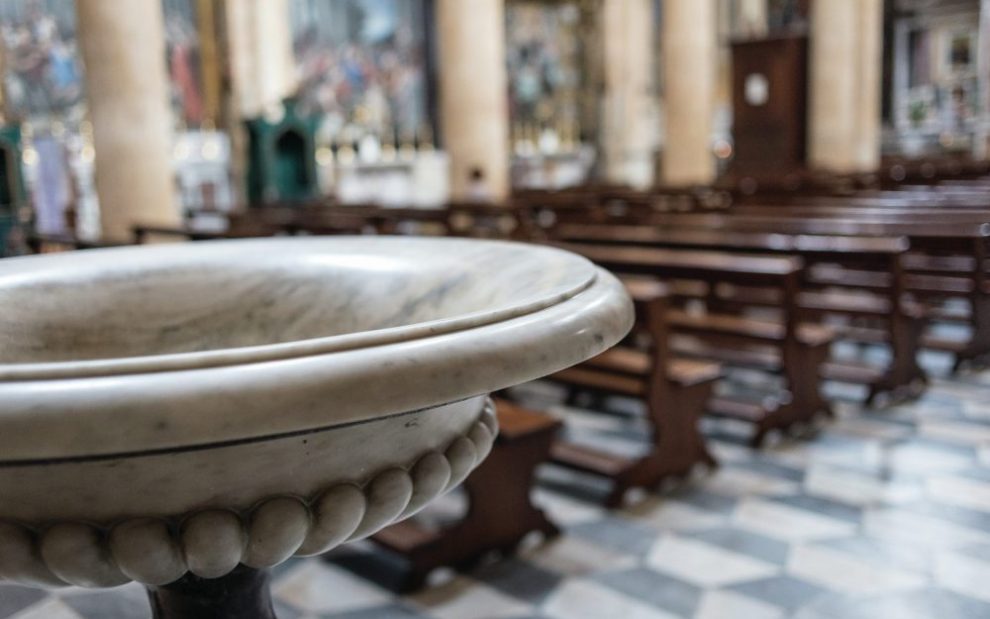In my final trimester of pregnancy with our firstborn, I followed all of the Prepare for Baby instructions provided enthusiastically by friends, strangers, and the internet. I installed the car seat, sent thank-you notes for shower gifts, and stocked our house with diapers, wipes, and formula. I didn’t prewash swaddles and onesies in fragrance-free baby detergent because washing brand-new clothes seemed senseless to me and at $2.50 per load of laundry I couldn’t see myself washing our daughter’s clothes separately throughout her babyhood. Why start now?
But I did plan our yet-to-be-born baby’s baptism.
Since long before I became a mother, I had visions of early baptisms for my future children. This desire formed not from theological convictions, as my belief in an infinitely loving and merciful God doesn’t put anyone’s salvation on the line, but rather from an unexamined feeling, a sense that early baptism just seemed right. I loved the idea of our babies’ baptisms being one of their first outings. I thought that a baptismal party seemed like the ideal occasion to introduce our newest family member to their faith community, extended relatives, and circle of friends. Besides, I wanted my babies to fit into my grandfather’s baptismal gown, a garment sewn back in the days when the suggestion of limbo wasn’t met with raised eyebrows and whose fragile seams would be threatened by a baby exceeding 10 pounds.
So, in those weeks leading up to labor, my husband and I conferred with godparents, met with our pastor, and selected a baptismal date. We told our families to mark their calendars and I commenced party planning. I even went so far as to email our parish music director to request specific songs for the Mass.
Our baby arrived, and weeks later she fit perfectly in my grandfather’s heirloom gown. Going forward, I’d probably not choose to host a weekend-long gathering for all of our out-of-town relatives five-weeks postpartum, but other than that the baptismal weekend was perfect.
Two years later, born during the historic year of 2020, our second daughter is nearing her first birthday unbaptized. In the grand scheme of pandemic-related griefs—from lives and jobs lost to the mental toll of prolonged anxiety and loneliness—this is a small one. But for me, it is still a grief, and I don’t think naming the smaller ways in which the pandemic has upended life as we knew it undermines the larger losses. As commencement ceremonies and bridal showers, birthday parties and class field trips, mommy groups and scout sleepovers, class reunions and weddings—all these sources of joy, meaning, and hope—have morphed and often, eventually, dissolved, the pandemic has whittled away at our relational, emotional, physical, and spiritual well-being. The nonexistence of my daughter’s baptism hits all these marks.
So why didn’t my husband and I just go ahead and baptize our daughter? The sacrament—the grace of which doesn’t depend on ordinary circumstance—was celebrated plenty of times this year, after all. Couldn’t we have had a small, immediate-family-only baptism on a quiet Sunday afternoon? My knee-jerk “No!” to this quandary came first but reflection quickly followed, and it clarified my understanding of baptism.
If the Son of God himself wasn’t a “check the box and be done with it” kind of guy, then, well, I don’t have to be either.
Advertisement
At a base level, my aversion to a baptism as it was possible reaffirmed my belief that the sacrament welcomes us to the body of Christ and invites us to a vocation of holiness, not that it acts as a protective mechanism from the fires of hell. If I had believed that baptism was the one-and-only ticket to heaven, I would have christened both my babies seconds after their births as they lay wailing on my chest. But I don’t believe that, and so having the option to wait months—even years—gave me the opportunity to consider what was worth waiting for or, in other words, what matters to me regarding the sacrament. Two priorities emerged.
The first is to have my community of faith gathered. I’m as aware as the next realist that it could be a very long time (forever?!) before pews are packed again with strangers squeezing past one another to get to their favorite spot on the bench, hundreds of people drinking from the same cup (can you imagine?!), a chorus of coughs from the congregation accompanying the choir in the Great Amen. While I long ago relinquished this vision, I would like to hold out on my daughter’s baptism until it can include at least a few friends and acquaintances from our church—the elderly woman who crocheted her a blanket, some of the teens from the youth group that I lead, a young family whose hand-me-down crib and pack-and-play are used daily in our home. I want a crew that diversely represents the body of Christ (as diverse as you can get in suburban Massachusetts), not just my nearest and dearest.
The second is my desire for the presence of our baby’s godparents. I read somewhere once that real greens should be used when making Advent wreaths whenever possible because our minds, memories, emotions, and spirits are stimulated by the senses. Fragrant evergreens and flickering flames create sensory experiences in a way that artificial branches and battery-operated candles cannot. This isn’t an official mandate, much like the presence of godparents isn’t technically required at a baptism. Stand-ins are acceptable, especially in particular circumstances (and if this isn’t the year of particular circumstances, what is?). But I think that physical presence does something. It honors and celebrates an important relationship. It creates a moment that creates a shared memory. It waters the seed of a relationship that I want to do everything in my power to help nourish.
There are moments when I wonder if I’m trying too hard to control the circumstances of my daughter’s baptism, if—with both a nagging perfectionism and an air of hubris—I’m trying to micromanage the outpouring of the Holy Spirit. Perhaps I am. Then again, Jesus turned water to wine during the wedding at Cana even though everyone would have survived without it. A crass utilitarian he was not. He did the unnecessary—the extra—in favor of celebration and delight. If the Son of God himself wasn’t a “check the box and be done with it” kind of guy, then, well, I don’t have to be either. I’m holding out for my daughter’s baptism with patient hope and joyful anticipation.
This article also appears in the July 2021 issue of U.S. Catholic (Vol. 86, No. 7, pages 43-44). Click here to subscribe to the magazine.
Image: iStock/ilbusca














Add comment